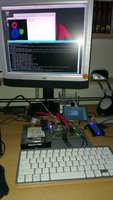Would automatic DHCP on eth0 be a sensible default for most users?
This was default in both aTC rootfs, normally we have later wlan on board, but for this, i don't know.
It may just be that "apt-get update" information in my images is more recent and so doesn't need updating?
You will be right, but sorry,i have no idea,

(This could be my default response for future)
I had done some test on /dev/sda (500GB sata disc WD5002ABYS)
command to see buffered and cached disk read speed: hdparm -Tt /dev/sda
Timing cached reads: 1638 MB in 2.00 seconds = 819.94 MB/sec
Timing buffered disk reads: 338 MB in 3.00 seconds = 112.61 MB/sec
Writting one big file, command: dd if=/dev/zero of=/tmp/test1.img bs=1G count=1 oflag=dsync
1+0 Datensätze ein
1+0 Datensätze aus
1073741824 Bytes (1,1 GB) kopiert, 12,4442 s, 86,3 MB/s
Writting 1000 files with 512KB, command: dd if=/dev/zero of=/tmp/test2.img bs=512 count=1000 oflag=dsync
1000+0 Datensätze ein
1000+0 Datensätze aus
512000 Bytes (512 kB) kopiert, 32,8706 s, 15,6 kB/s
Ok, random writes not so fast..
Next, i install a compiler and compiled a SDL game, bumprace, and running inside xrdp session, slow but playable. My hdmi display was to small for it, only 800x480.
I have done this in both rootfs and i see no big difference,so what next?
Thomas
[doublepost=1465834739,1465832979][/doublepost]I had run some gles test, glxgears runs with 150 FPS on my little display, MegaGlest is running, but very slow.
Thomas



